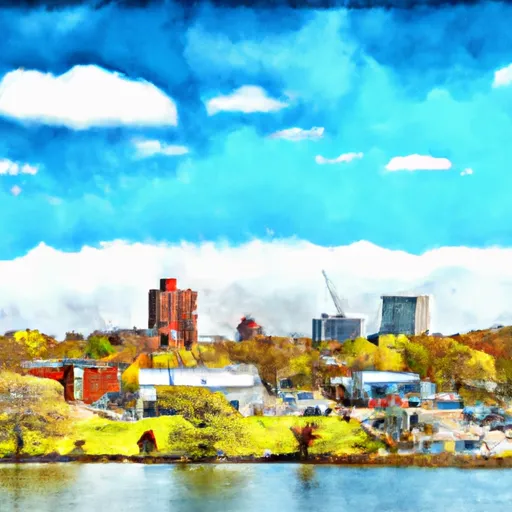-
 Snoflo Premium
Snoflo Premium
Get unlimited access to all our content
With no Ad interruptions! - Start Your Free Trial Login with existing account
Rockland
Eden Index
Climate
5.8
•
Recreation
3.5
•
Community
•
Safeguard
3.5/10

Rockland, Michigan, located in Ontonagon County, is a scenic town with a diverse climate and abundant outdoor recreation opportunities. The region experiences a continental climate, characterized by cold winters and mild summers. Average temperatures range from 15°F (-9°C) in winter to 75°F (24°C) in summer, providing a distinct four-season experience.
Rockland is surrounded by pristine lakes, rivers, and forests, making it a paradise for outdoor enthusiasts. The Ontonagon River, flowing through the town, offers opportunities for fishing, canoeing, and kayaking. The area is also known for its numerous waterfalls, including the picturesque Bond Falls.
Hydrologically, the region is home to several lakes, such as Lake Gogebic, which is the largest inland lake in the Upper Peninsula. These lakes provide ample opportunities for swimming, boating, and fishing.
Outdoor recreation opportunities in Rockland extend beyond the water. The nearby Porcupine Mountains Wilderness State Park offers miles of hiking and biking trails, along with camping and wildlife observation. Additionally, the area is ideal for hunting, snowmobiling, cross-country skiing, and snowshoeing during the winter months.
In summary, Rockland, Michigan boasts a varied climate, pristine hydrology constituents, and an array of outdoor recreation opportunities, making it an ideal destination for nature lovers and adventure seekers throughout the year.
What is the Eden Index?
The Snoflo Eden Index serves as a comprehensive rating system for regions, evaluating their desirability through a holistic assessment of climate health, outdoor recreation opportunities, and natural disaster risk, acknowledging the profound impact of these factors on livability and well-being.
Climate Health Indicator (CHI): 5.8
Rockland receives approximately
850mm of rain per year,
with humidity levels near 83%
and air temperatures averaging around
6°C.
Rockland has a plant hardyness factor of
4, meaning
plants and agriculture in this region thrive during a short period during spring and early summer. Most
plants will die off during the colder winter months.
By considering the ideal temperature range, reliable water supplies, clean air, and stable seasonal rain or snowpacks, the Climate Health Indicator (CHI) underscores the significance of a healthy climate as the foundation for quality living.
A healthy climate is paramount for ensuring a high quality of life and livability in a region, fostering both physical well-being and environmental harmony. This can be characterized by ideal temperatures, reliable access to water supplies, clean air, and consistent seasonal rain or snowpacks.
Weather Forecast
Streamflow Conditions
Southcentral Lake Superior
Area Rivers
Southcentral Lake Superior
Snowpack Depths
Southcentral Lake Superior
Reservoir Storage Capacity
Southcentral Lake Superior
Groundwater Levels
Recreational Opportunity Index (ROI): 3.5
The Recreational Opportunity Index (ROI) recognizes the value of outdoor recreational options, such as parks, hiking trails, camping sites, and fishing spots, while acknowledging that climate plays a pivotal role in ensuring the comfort and consistency of these experiences.
Access to outdoor recreational opportunities, encompassing activities such as parks, hiking, camping, and fishing, is crucial for overall well-being, and the climate plays a pivotal role in enabling and enhancing these experiences, ensuring that individuals can engage in nature-based activities comfortably and consistently.
Camping Areas
| Campground | Campsites | Reservations | Toilets | Showers | Elevation |
|---|---|---|---|---|---|
| Turkey Creek Water Park | 22 | 434 ft | |||
| Ramsey Lake State Park | 160 | 628 ft | |||
| Boulder - Lake Carlyle | 90 | 457 ft | |||
| Lake Boque Homa | None | 238 ft | |||
| Coles Creek - Lake Carlyle | 150 | 459 ft | |||
| Eldon Hazlet State Park | 350 | 455 ft | |||
| Dam West - Lake Carlyle | 110 | 453 ft | |||
| Lake Claude Bennett | 31 | 414 ft | |||
| Marathon Lake | 71 | 481 ft | |||
| Big Creek Waterpark | None | 254 ft |
Nearby Fishing
Nearby Ski Areas
Catastrophe Safeguard Index (CSI):
The Catastrophe Safeguard Index (CSI) recognizes that natural disaster risk, encompassing floods, fires, hurricanes, and tornadoes, can drastically affect safety and the overall appeal of an area.
The level of natural disaster risk in a region significantly affects safety and the overall livability, with climate change amplifying these risks by potentially increasing the frequency and intensity of events like floods, fires, hurricanes, and tornadoes, thereby posing substantial challenges to community resilience and well-being.
Community Resilience Indicator (CRI):
The Community Resilience Indicator (CRI) recognizes that education, healthcare, and socioeconomics are crucial to the well-being of a region. The CRI acknowledges the profound impact of these elements on residents' overall quality of life. By evaluating educational resources, healthcare accessibility, and economic inclusivity, the index captures the essential aspects that contribute to a thriving community, fostering resident satisfaction, equity, and social cohesion.

